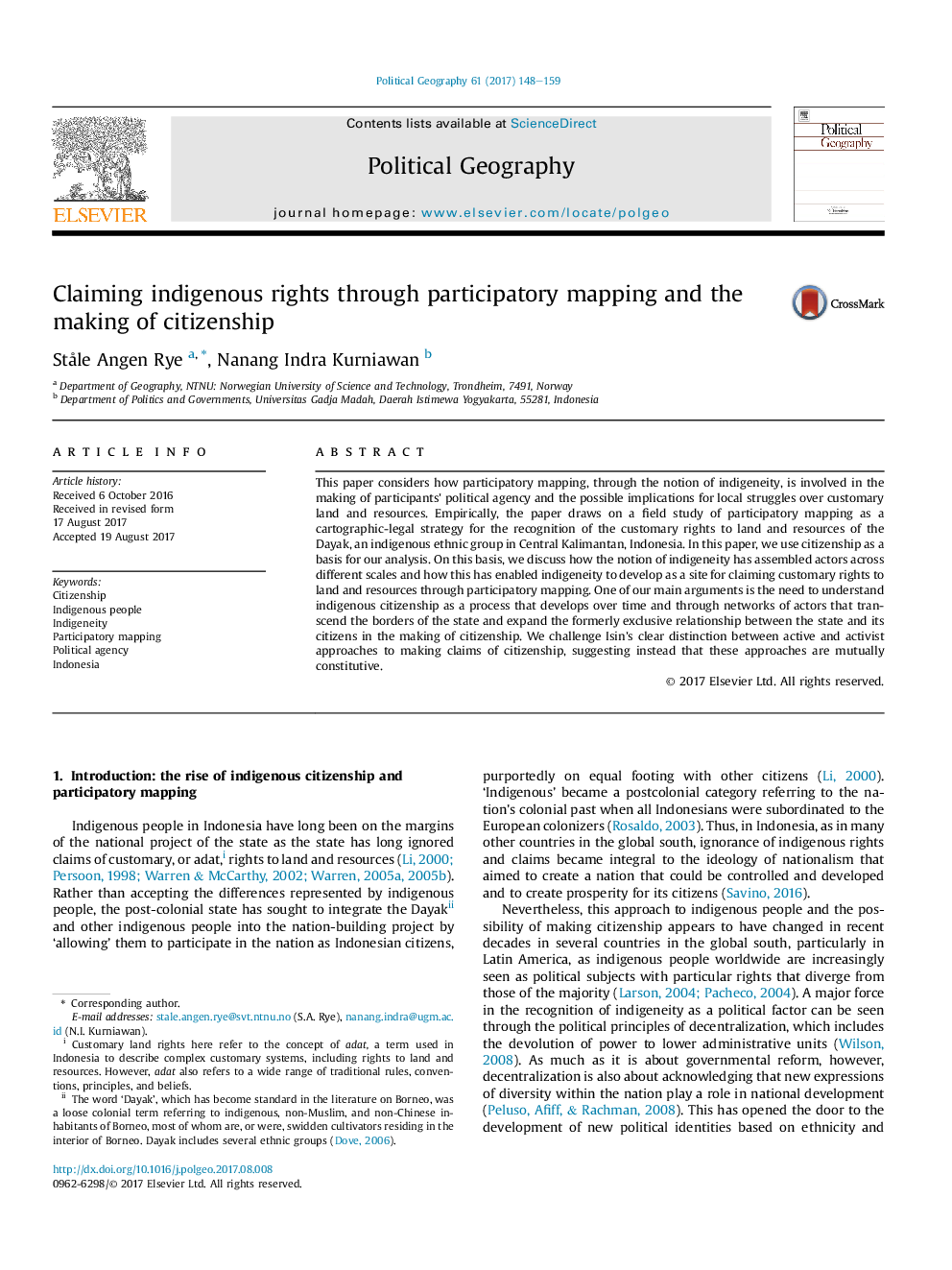| کد مقاله | کد نشریه | سال انتشار | مقاله انگلیسی | نسخه تمام متن |
|---|---|---|---|---|
| 5118436 | 1485571 | 2017 | 12 صفحه PDF | دانلود رایگان |
عنوان انگلیسی مقاله ISI
Claiming indigenous rights through participatory mapping and the making of citizenship
ترجمه فارسی عنوان
ادعای حقوق بومی از طریق نقشه برداری مشارکتی و ایجاد شهروندی
دانلود مقاله + سفارش ترجمه
دانلود مقاله ISI انگلیسی
رایگان برای ایرانیان
کلمات کلیدی
شهروندی مردم بومی، بی خوابی، نقشه برداری مشارکتی، آژانس سیاسی، اندونزی،
ترجمه چکیده
در این مقاله، چگونگی شکل گیری مشارکتی، از طریق مفهوم بی ثباتی، درگیر ساختن آژانس سیاسی شرکت کنندگان و پیامدهای احتمالی آن برای مبارزات محلی بر سرزمین و منابع عادی است. به لحاظ تجربی، این مقاله بر روی مطالعات میدانی نقشه برداری مشارکتی به عنوان یک استراتژی حقوقی-نقشهبرداری برای به رسمیت شناختن حقوق عرفی به زمین و منابع دایاک، یک گروه قومی بومی در کلمنتان مرکزی اندونزی، متکی است. در این مقاله، از شهروندی به عنوان مبنایی برای تحلیل ما استفاده می کنیم. بر این اساس، ما بحث می کنیم که چگونه مفهوم بی ثباتی بازیگران را در مقیاس های مختلف جمع کرده است و چگونه این امکان را فراهم می کند که بومی بودن به عنوان یک سایت برای ادعای حقوق عرفی به زمین و منابع از طریق نقشه برداری مشارکتی امکان پذیر است. یکی از استدلال های اصلی ما، این است که شهروندی بومی را به عنوان فرآیندی توسعه می دهد که با گذشت زمان و از طریق شبکه های بازیگران فراتر از مرزهای دولت و گسترش روابط منحصر به فرد بین دولت و شهروندان آن در ایجاد شهروندی، گسترش می یابد. ما با تمایز روشن بین شیوه های فعال و فعال برای ادعای شهروندی چالش می کشیم، و پیشنهاد می کنیم که این رویکردها متقابلا سازنده باشند.
موضوعات مرتبط
علوم انسانی و اجتماعی
علوم انسانی و هنر
تاریخ
چکیده انگلیسی
This paper considers how participatory mapping, through the notion of indigeneity, is involved in the making of participants' political agency and the possible implications for local struggles over customary land and resources. Empirically, the paper draws on a field study of participatory mapping as a cartographic-legal strategy for the recognition of the customary rights to land and resources of the Dayak, an indigenous ethnic group in Central Kalimantan, Indonesia. In this paper, we use citizenship as a basis for our analysis. On this basis, we discuss how the notion of indigeneity has assembled actors across different scales and how this has enabled indigeneity to develop as a site for claiming customary rights to land and resources through participatory mapping. One of our main arguments is the need to understand indigenous citizenship as a process that develops over time and through networks of actors that transcend the borders of the state and expand the formerly exclusive relationship between the state and its citizens in the making of citizenship. We challenge Isin's clear distinction between active and activist approaches to making claims of citizenship, suggesting instead that these approaches are mutually constitutive.
ناشر
Database: Elsevier - ScienceDirect (ساینس دایرکت)
Journal: Political Geography - Volume 61, November 2017, Pages 148-159
Journal: Political Geography - Volume 61, November 2017, Pages 148-159
نویسندگان
Ståle Angen Rye, Nanang Indra Kurniawan,
